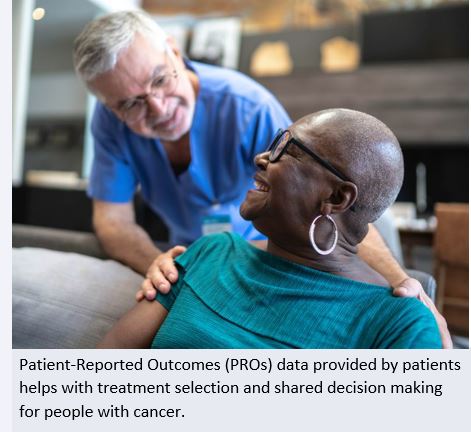Date Posted, by DCP Staff

Results from two NCI-supported studies relating to symptom management were among the significant findings presented at the June 2023 Annual Meeting of the American Society of Clinical Oncology (ASCO). The study results, which both incorporated data from patient-reported outcomes (PROs), have the potential to help reduce toxic side effects and improve quality of life for people with cancer.
Omitting Radiation Therapy Possible for Some Patients with Rectal Cancer
In a plenary session at the meeting, findings from the NCI-supported PROSPECT clinical trial were presented showing that patients with locally advanced rectal cancer with tumors that respond to chemotherapy can safely forego radiation therapy before surgery. This is important because omitting radiation therapy can reduce both short- and long-term side effects that impact quality of life—including fertility problems, diarrhea, and bowel and bladder problems—and the results show this can be done while having similar outcomes in disease-free and overall survival. Findings were simultaneously published in the New England Journal of Medicine (efficacy) and the Journal of Clinical Oncology (PROs).
The findings are “practice changing,” said Pamela L. Kunz, M.D., an ASCO expert, in a press release. “As we develop new therapies, we are also exploring where we can eliminate toxic therapies for our patients’ wellbeing,” she said. “The findings of this study allow us to do just that, showing we can omit radiation therapy for some patients, improving quality of life without compromising efficacy.”
Resources Available to Guide Summarizing and Visualizing Patient Tolerability Data
The phase III study included 1,128 people with locally advanced rectal cancer that had spread to nearby tissue or lymph nodes, meaning they were eligible to receive chemotherapy and radiation therapy before surgery. The participants were randomly assigned to two groups: the first group receiving the standard treatment of chemoradiation prior to surgery, and the second group receiving a chemotherapy treatment called mFOLFOX6 that did not include radiation. For those in the second group, if a tumor shrank by 20% or more, that patient immediately had surgery without receiving radiation. If the tumor didn’t shrink by 20% or more, or the patient was unable to continue with mFOLFOX6, they received the same chemoradiation treatment as the first group prior to surgery. The researchers found that after 5 years, there was no statistically significant difference between the two treatment groups in any of the endpoints studied, including disease-free and overall survival.
As part of the trial, participants were asked about the symptoms they experienced before the trial, during treatment, and at 12 months after surgery. These PROs included 14 symptoms from NCI’s Patient-Reported Outcomes version of the Common Terminology Criteria for Adverse Events (PRO-CTCAE) measurement system. During treatment, patients in the group that received FOLFOX reported lower rates of diarrhea and better overall bowel function, while those in the control group had lower rates of anxiety, appetite loss, constipation, depression, dysphagia, and several other symptoms. At 12 months after surgery, patients who received FOLFOX reported significantly lower rates of fatigue and neuropathy, and better sexual function, than those in the control group. The researchers wrote that these findings will help inform treatment selection and shared decision making for future patients.
Having the option to forego radiation therapy for patients with locally advanced rectal cancer is important for several reasons, said lead author Deb Schrag, M.D., chair of the Department of Medicine at Memorial Sloan Kettering Cancer Center, in the ASCO press release. One reason is that, in many parts of the world, radiation therapy isn’t readily accessible, so an all-chemotherapy approach could reach more people, she said.
“Additionally, given the rising rates of colorectal cancer in young patients, this provides an option for patients who wish to preserve fertility or avoid early menopause,” she said.
The Alliance for Cancer Clinical Trials in Oncology is conducting the trial through the National Clinical Trials Network (NCTN) and the NCI Community Oncology Research Program (NCORP).
Taxanes Induce Persistent Peripheral Neuropathy in People with Breast Cancer
Initial results from a large prospective study on taxane-related chemotherapy-induced peripheral neuropathy (CIPN) were also presented at the meeting (abstract 223187).
Symptoms associated with CIPN include nerve pain, tingling, and numbness in the hands and feet, and often occur due to certain cancer treatments, including the taxane drugs paclitaxel and docetaxel. Investigators in the SWOG Cancer Research Network S1714 clinical trial wanted to better understand peripheral neuropathy due to these treatments. They found that people who receive taxane treatment for breast cancer experience a pattern of significant, ongoing nerve problems associated with CIPN—including sensory symptoms like tingling in feet or hands and motor symptoms like weak or achy muscles that affect balance. They also found that patients experience more severe symptoms with paclitaxel than with docetaxel.
The S1714 study enrolled 1,336 patients with either non-small cell lung cancer, breast cancer, or ovarian/fallopian tube cancer who were receiving paclitaxel or docetaxel. The ASCO abstract reports data from 1,103 participants with breast cancer. Participants were evaluated for symptoms of peripheral neuropathy before treatment and at several intervals after registration. They completed self-assessments using an established patient-reported outcomes questionnaire, and clinicians assessed them for CIPN symptoms using NCI’s CTCAE.

Through 24 weeks, participants with breast cancer in the study experienced significant sensory and motor symptoms that were persistent and affected their quality of life. At nearly every time point, participants treated with paclitaxel had more sensory neuropathy than those treated with docetaxel.
Factors such as a person’s age, preexisting neuropathy, and previous treatment with paclitaxel are currently seen as strong predictors of neuropathy. According to a SWOG press release, the larger goal of the study is to develop a risk prediction model that can help doctors individualize patient care using common clinical factors. The researchers also collected blood samples from all enrolled patients at multiple time points which they are analyzing to identify potential biological predictors.
“There is a need to better understand CIPN, as it has the potential to impact patient outcomes and quality of life,” said Meghna S. Trivedi, M.D., of the Columbia University Herbert Irving Comprehensive Cancer Center, in the press release. She leads the study and presented the results at the ASCO meeting.
These findings will help researchers better characterize these symptoms, she said, “so that we can not only individualize cancer treatment strategies, but also identify novel interventions for the prevention and treatment of CIPN.”
If you would like to reproduce some or all of this content, see Reuse of NCI Information for guidance about copyright and permissions. Please credit the National Cancer Institute as the source and link directly to the blog post using the original title, for example: "Important Symptom Management Findings Presented at 2023 ASCO Meeting was originally published by the National Cancer Institute." For questions, contact us at CancerPreventionBlog@mail.nih.gov.
